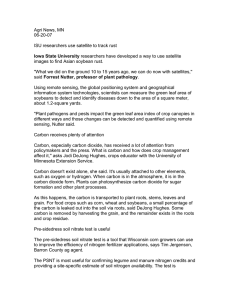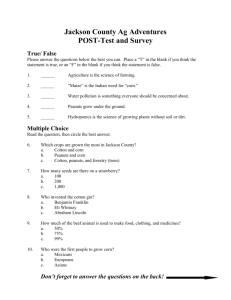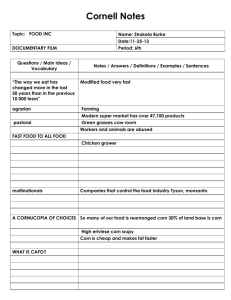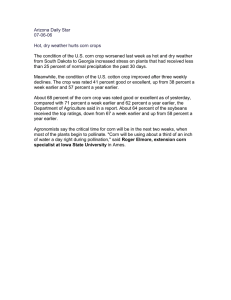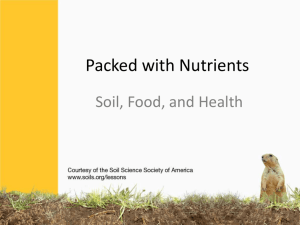Crop Water and Soil Fertility Relationships Bob Glodt Agri-Search, Inc.
advertisement
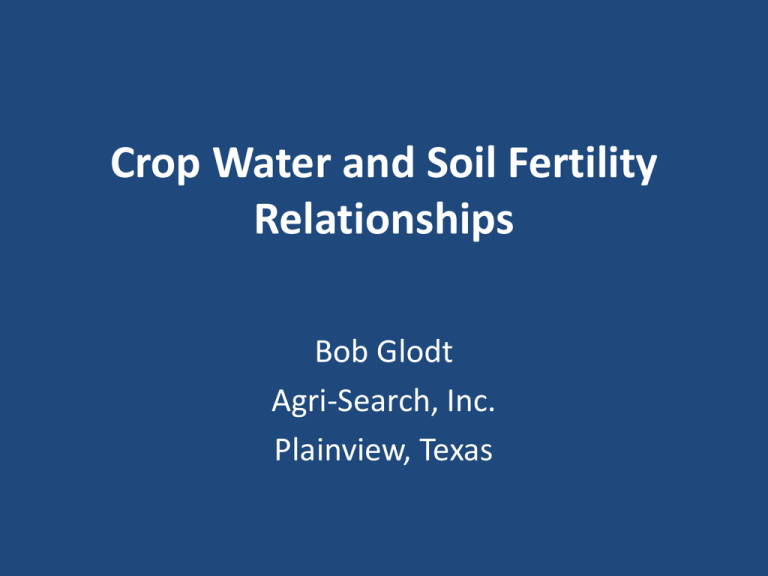
Crop Water and Soil Fertility Relationships Bob Glodt Agri-Search, Inc. Plainview, Texas “It ain’t what you don’t know that gets you into trouble. It’s what you know for sure that just ain’t so.” Mark Twain There is no soil test that can compensate for a poorly collected sample! Basics of Soil Sampling • Soil sampling depth must be consistent. • Sub-sample size must be consistent. • Samples should be crop or field specific. • Use plastic bucket when collecting samples. • Keep samples cool and deliver to the lab immediately. • 12 – 15 cores per sample. Liebeg’s Law of the Minimum - 1840 Yield is proportional to the amount of the most limiting nutrient. N, P, and Zinc • These are the three most important nutrients that affect cotton, corn, grain sorghum, and wheat yields. • A good fertility program should meet the crop needs for these nutrients first. • Growers who own their own land or with long term lease agreements should consider build maintenance fertility programs for the non soluble nutrients (P and Zinc) Nutrient Management Based on Water Solubility Insoluble Nutrients Soluble Nutrients • Phosphorus • Zinc • Nitrogen • Sulfur Sufficiency Guidelines For P in Corn Production (Kansas State University) Soil Test Bray P1 ppm 0-5 5-10 10-15 15-20 20+ Removal Corn Yield Goal in Bushels Per Acre 60 55 40 25 15 0 20 100 140 180 220 60 45 25 15 0 33 Lb. P205/A 70 50 30 15 0 46 75 55 30 15 0 59 80 60 37 15 0 73 Maintenance Build Phosphorus Rec. 2008 – 2015 Gunter Farm (E ½ Pivot) 82 CORN + 53 P 69 CORN + 42 P 2010 82 COTTON +0P 2009 COTTON +0P CORN + 48 P 5 COTTON +0P 58 15 10 79 76 CORN + 62 P PPM – Soil Test 25 20 96 93 CORN + 45 P 30 2012 2013 2014 2015 0 2008 2011 Maintenance-Build Zinc Rec. 2008 – 2015 Gunter Farm (E ½ Pivot) 2 1.8 1.4 1.2 2008 2009 2010 2011 2012 CORN + 0 Zn CORN 6 LBS. Zn 0 COTTON + 4 LBS. Zn 0.2 CORN + 3 LBS. Zn 0.4 COTTON + 0 Zn 0.6 CORN + 6 LBS. Zn 0.8 COTTON + 0 Zn 1 CORN + 0 Zn PPM – Soil Test 1.6 2013 2014 2015 Cotton Nutrient Uptake • Soil nutrients are taken up in direct proportion to growth and temperature. • Total nutrient uptake for N, P, and K tracks cumulative heat units precisely. • During the spring growing period when heat units are low, cotton grows slowly and takes up only limited amounts of nutrients. • It is during the peak growing months of June, July, and August when nutrients need to be available. Days After Planting maturity first open boll first bloom first square emergence Inches Per Day HYPOTHETICAL WATER USE CURVE FOR COTTON (INCHES PER DAY) Cow Feeding Program? Put all the hay out in the fall and come back and check on the cows in the spring. Nitrogen Uptake - Cotton • Cotton stores N in the leaves during periods of greater availability for later use during the peak demand period of boll setting. • The highly soluble nutrients are swept into the roots with the soil water that is pulled up through the plant and out the leaves (via transpiration). • Mass flow is greatest when cotton is well watered. • The uptake of most nutrients, not just N, is reduced when crop water use is decreased from drought, cold weather or wet humid weather. Prescription For Top Yields • Determine reasonable yield goals based on your ability to irrigation at a given percentage of PET. • Meet N, P, and Zinc demands for the crop based on accurate soil tests and reasonable yield goals. • P and Zinc are immobile and therefore, should be applied and incorporated into the soil prior to planting. • Nitrogen demand increases at approximately the same rate as heat units are accumulated. • Split nitrogen applications to coincide with demand and drive nitrogen down to the effective rooting depth. Nitrogen Leaching Versus Denitrification Denitrification Leaching • A major event when • A physical event. soils are saturated. • Loss of NO3 nitrogen as it moves • Saturated soils remove oxygen from with the water the soil. below the root zone. • Oxygen is required for root tips to grow where N is taken up. Which Irrigation System Best Minimizes Nitrogen Loss? LEPA (ALTERNATE FURROW) BROADCAST SPRAY Which Irrigation System Is Best Suited For In Season Nitrogen Applications? LEPA (ALTERNATE FURROW) BROADCAST SPRAY Which System Is Best Suited For Meeting Water Crop Demand? LEPA (ALTERNATE FURROW) BROADCAST SPRAY THANK YOU FOR YOUR ATTENTION!
